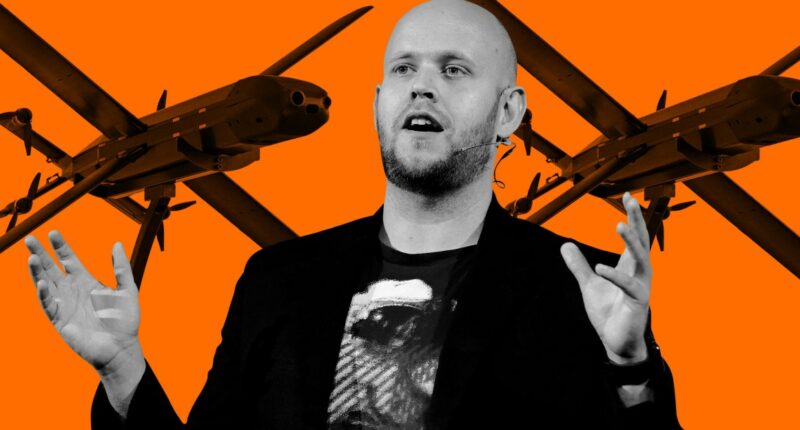Share this @internewscast.com
Spotify has frequently been in the spotlight over the years due to various grievances from artists, including issues like subpar audio quality, unsatisfactory remunerations, and lucrative deals with figures like Joe Rogan. However, CEO and founder Daniel Ek’s extracurricular ventures, particularly his investments in the German defense company Helsing through Prima Materia, have caused recent uproar. Acts such as Hotline TNT, Massive Attack, Godspeed You! Black Emperor, and Deerhoof have voiced their dissatisfaction over this move.
On Tuesday, Ek made an announcement regarding his resignation as CEO. Neither he nor Spotify provided any hint that the controversy surrounding his engagement in military investments influenced this decision. Yet, if Spotify aimed to retain artists by replacing Ek, it appears that their expectations may not align with reality.
“Our issues with this particular streaming platform go far beyond one reptile.”
— Will Anderson of Hotline TNT
The Verge contacted several artists and labels that have withdrawn their music from Spotify, and the responses suggested no immediate plans to return. This is partly because Ek’s transition is mostly nominal. He will continue as executive chairman, and during the announcement of Gustav Söderström and Alex Norström as the new co-CEOs, Ek undermined their authority by stating, “Gustav and Alex will continue to report to me … I will be more hands-on than some of my U.S. peers who have a Chairman title.” When asked about the specifics of Ek’s role, Spotify declined to elaborate.
While Ek may delegate some daily operational tasks, his influence over company decisions remains substantial. Jeremy Leaird-Koch, known as Jeremy Blake and host of the Red Means Recording YouTube channel, removed his music in July and told The Verge that these leadership adjustments “change nothing.” He emphasized that an Executive Chairman is pivotal in leadership, being actively involved in strategic and day-to-day operations.
Will Anderson of Hotline TNT echoed this sentiment, telling The Verge, “The company’s own statements suggest nothing significant will change. Their statement notes the shift ‘formalizes how Spotify has effectively operated since 2023’. It seems like an attempt to present the CEO title alteration as a strategic move to regain public favor before any negative perception escalates.”
“The rare thing Senate Republicans and Democrats seem to agree on is that Spotify is out of control.”
Colin Volvert, who manages the label Kalahari Oyster Cult that removed its catalog from Spotify in June, remains unconvinced. “We’re monitoring developments, but currently, this appears to be an optics-driven managerial move,” he told The Verge. “It’s not the fresh start we hoped for. More likely, it allows Ek more freedom to pursue his controversial projects.”
What Anderson, Leaird-Koch, and others have made clear, though, is that this was never just about Daniel Ek. Anderson says, “Our issues with this particular streaming platform go far beyond one reptile.” His “funding AI battle tech,” to use Deerhoof drummer Greg Saunier’s words, was merely the last thing in a litany of issues. Satomi Matsuzaki, Deerhoof’s vocalist, was unequivocal in a statement to The Verge:
“We won’t return to Spotify unless they start to treat every artist respectfully and pay them a fair amount. They must stop making money by using AI scams. Artists are struggling to survive. Spotify’s payment of $0.003 per stream won’t even get us a can of soda. Their system won’t change dramatically. Good news is Deerhoof will still exist without Spotify if you type ‘Deerhoof’ into your search engine. Spotify does not define our existence.”
Spotify’s payouts have long been the biggest issue for artists and, without a change, it’s unlikely that this recent exodus will slow. Spotify has one of the lowest per-stream rates in the industry. Most estimates place it between $0.003 and $0.005 in recent years. (Though Spotify’s opaque method of calculating royalties makes it hard to know for sure.) It’s the primary reason big names like Thom Yorke and Taylor Swift have pulled their music from the service in the past, though both artists eventually returned. And for small artists, those whose tracks get fewer than 1,000 streams per year, the payout is $0. The company’s payouts are so low, in fact, that it has attracted the attention of the European Parliament and the United States Congress.
The issue goes beyond simply undervaluing artists. In 2024 the company changed its Premium plan to include audiobooks, which allowed it to suppress royalty payouts by bundling audiobooks with music. With dramatically more hours of content to divide subscription revenue among, royalty payouts dropped by $150 million, while Spotify’s revenue continued to climb dramatically. The underhanded tactics the company uses to artificially suppress royalty rates were even the target of a bipartisan call for an investigation in June — the rare thing Senate Republicans and Democrats seem to agree on is that Spotify is out of control.
Leaird-Koch sees this valuing of profit over art as the ultimate problem. “Spotify is going to have to make Herculean efforts to roll back tons of damaging choices they’ve introduced to their platform over the years. I don’t see that happening with a publicly traded company that’s beholden to generate profit for shareholders,” he said.
Some artists have proven that, while it might not always be easy, you can find success without Spotify. Joanna Newsom has never put her music on Spotify, calling it a “villainous cabal” in an interview with the Los Angeles Times. And Cindy Lee made herself a critical darling with Pitchfork’s No. 1 record of 2024, Diamond Jubilee, but the album is unavailable on streaming platforms.
Between the proliferation of AI slop, association with controversial figures, and terrible royalty rates, Spotify has plenty of other baggage beyond Daniel Ek’s investment in military companies. Xiu Xiu’s Jamie Stewart told Anthony Fantano that “us being off of Spotify is not going to make any real financial impact for them. It really has more to do with our conscience.” But Anderson was a bit more optimistic about artists’ ability to effect change: “It seems like Spotify is rattled, and they should be.”








